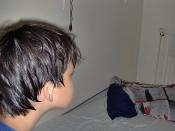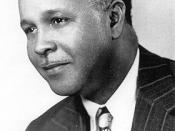Haroldson Lafayette Hunt once wisely proffered the following advice, "Decide what you want, decide what you are willing to exchange for it. Establish your priorities and go to work." Hunt was attempting to say if you turn your dream into an experiment and then decide how much time you are willing to exchange to see your experiment become reality, you will be successful. Two individuals who became very successful with their experiments are Barbara McClintock and Percy Lavon Julian. Although these historical figures were both successful with their scientific research, they differed in the discrimination they faced, and their pathway to success.
To begin with, McClintock and Julian both were very successful in their scientific research. McClintock's success allowed her to discovered that some of the main beliefs about genes were incorrect. For example, McClintock performed an experiment that led her to believe that genes can move around the chromosomes instead of staying in one place.
McClintock was the first person to figure out these jumping genes. She was honored for her pioneer work and won many awards include the Nobel Prize, which was the most impressive honor in the world of science. On the other hand, Julian was just as successful as McClintock. Julian created many successful materials that helped many people. One of his creations was a substance called Aero-Foam that puts out gasoline and oil fires. This substance helped save many lives. Another one of Julian's great successes was inventing Substance S. This drug is very similar to cortisone, but is much less expensive than cortisone, which helps many people to afford it. Julian's inventions were so successful that most of them even changed many people's lives. Both McClintock and Julian were very successful creators.
Although McClintock and Julian were similar in the success they achieved, they faced different forms of discrimination. McClintock was discriminated against because she was a woman. No university would hire her as a full professor because of her gender. People sometimes did not even believe what she said. When McClintock presented her idea that genes can jump from one place to another, all the listeners laughed at her and thought she was insane. However, Julian experienced a different form of discrimination. Julian was discriminated against because he was black. He was told that getting a doctorate in chemistry would be a waste of time, because no matter how well he did in school, no laboratory would hire him as a researcher because of his color. Julian wanted to give up his dream of becoming a scientist, because he was told that there would be no future for a Negro scientist. All of these discriminations affected both McClintock's and Julian's lives.
Finally, these two scientists differed in their pathways to success. McClintock started by being a solitary researcher. Although she missed the excitement of exchanging ideas with colleagues, she welcomed having long stretches of time alone with nothing to distract her from her work. Being a solitary researcher allowed McClintock to discovered more things that other people did not know, which could also help her succeed. On the other hand, Julian had a different pathway to success. He started by teaching chemistry at Fisk University. Then he accepted a scholarship to Harvard University. Julian worked as a professor for many years before he finally decided to get his doctorate. Both of these scientists performed well but followed different pathways to success.
Ultimately, Barbara McClintock and Percy Lavon Julian were both great scientists even if they did have more differences than similarities. However, they both did turn their dreams into goals and were willing to spend time to make their experiments become reality. Although these two scientists are different in the discrimination they faced and their pathways to success, they both were successful scientists.





